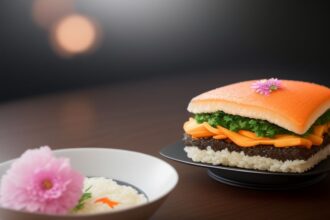When it comes to traditional Thai cuisine, the use of fresh ingredients is key in creating dishes that are not only flavorful but also packed with health benefits. In this article, we will explore some of the common ingredients used in Thai cooking and delve into the various health benefits they offer.
Heading 1: Introduction to Traditional Thai Ingredients
Thai cuisine is known for its bold flavors and aromatic spices, many of which provide a range of health benefits. Traditional Thai ingredients are packed with nutrients and antioxidants that can boost immunity, aid digestion, reduce inflammation, and even improve skin health. Let’s take a closer look at some of the common ingredients used in Thai cooking and explore the health benefits they offer.
Heading 2: Lemongrass
Lemongrass is a staple in Thai cuisine, known for its citrusy flavor and aromatic fragrance. Rich in antioxidants, lemongrass can help reduce inflammation, boost metabolism, and aid in digestion. It is also believed to have antibacterial and antifungal properties, making it a popular ingredient in traditional medicine for treating various ailments.
Heading 3: Galangal
Galangal is a rhizome similar to ginger but with a more pungent flavor. It is often used in Thai curry pastes and soups for its unique taste and medicinal properties. Galangal is known for its anti-inflammatory and antibacterial properties, and it is believed to aid in digestion and improve circulation.
Heading 4: Kaffir Lime Leaves
Kaffir lime leaves are widely used in Thai cuisine for their fragrant aroma and citrusy flavor. These leaves are rich in antioxidants and essential oils that can help improve digestion, reduce inflammation, and boost immunity. Kaffir lime leaves are also believed to have antimicrobial properties, making them a common ingredient in traditional herbal remedies.
Heading 5: Thai Bird’s Eye Chili
Thai bird’s eye chili is a small but fiery pepper that adds heat and flavor to Thai dishes. Despite their size, these chilies are packed with capsaicin, a compound that has been shown to boost metabolism, reduce pain and inflammation, and even improve heart health. Thai bird’s eye chilies are also rich in vitamins A and C, which can help strengthen the immune system.
Heading 6: Turmeric
Turmeric is a vibrant orange spice that is widely used in Thai curries and stir-fries for its earthy flavor and medicinal properties. Curcumin, the active compound in turmeric, is a powerful antioxidant that can help reduce inflammation, boost brain health, and improve digestion. Turmeric is also believed to have anti-cancer properties and may help reduce the risk of chronic diseases.

Heading 7: Coconut Milk
Coconut milk is a key ingredient in Thai cuisine, known for its rich and creamy texture. Despite its high fat content, coconut milk is rich in medium-chain triglycerides (MCTs) that can boost metabolism, aid in weight loss, and improve heart health. Coconut milk is also a good source of vitamins and minerals, including vitamin C, iron, and magnesium.
Heading 8: Thai Basil
Thai basil is a variety of basil with a licorice-like flavor that is commonly used in Thai salads, stir-fries, and curries. This herb is rich in vitamins A and K, as well as essential oils that can help reduce inflammation, improve digestion, and boost immunity. Thai basil is also believed to have antimicrobial properties that can help fight infections.
Heading 9: Tamarind
Tamarind is a sweet and tangy fruit that is commonly used in Thai sauces and soups for its unique flavor. Rich in antioxidants and fiber, tamarind can help improve digestion, reduce cholesterol levels, and regulate blood sugar. Tamarind is also a good source of vitamin C, iron, and potassium, making it a nutritious addition to a balanced diet.
Heading 10: Fish Sauce
Fish sauce is a staple condiment in Thai cuisine, known for its salty and savory flavor. Despite its pungent aroma, fish sauce is rich in essential amino acids and minerals that can help improve digestion, boost immunity, and regulate blood pressure. Fish sauce is also a good source of omega-3 fatty acids, which are essential for heart health and brain function.
Heading 11: Palm Sugar
Palm sugar is a natural sweetener made from the sap of palm trees, commonly used in Thai desserts and marinades. Unlike refined sugar, palm sugar is unprocessed and retains its natural vitamins and minerals, including potassium, iron, and magnesium. Palm sugar is also known for its low glycemic index, making it a healthier alternative to white sugar for managing blood sugar levels.
Heading 12: Garlic
Garlic is a widely used herb in Thai cooking, known for its pungent flavor and medicinal properties. Rich in allicin, a sulfur compound with antimicrobial and anti-inflammatory properties, garlic can help boost immunity, reduce blood pressure, and improve heart health. Garlic is also believed to have anti-cancer properties and may help protect against chronic diseases.
Heading 13: Shallots
Shallots are a variety of onion with a milder flavor that is commonly used in Thai curries, stir-fries, and salads. Rich in antioxidants and essential oils, shallots can help reduce inflammation, improve digestion, and boost immunity. Shallots are also a good source of vitamins C and K, as well as minerals like iron and manganese.
Heading 14: Coriander
Coriander, also known as cilantro, is a versatile herb used in Thai dishes for its fresh and citrusy flavor. Rich in antioxidants, vitamins A and K, and essential oils, coriander can help reduce inflammation, improve digestion, and boost immunity. Coriander is also believed to have antimicrobial properties that can help fight infections and promote overall health.
Heading 15: Conclusion
Traditional Thai ingredients are not only delicious but also offer a wide range of health benefits that can help improve overall well-being. From lemongrass and galangal to turmeric and coconut milk, each ingredient plays a vital role in creating flavorful dishes that nourish the body and support optimal health. By incorporating these ingredients into your diet, you can experience the unique flavors and health benefits of traditional Thai cuisine.
FAQs about “Exploring the Health Benefits of Traditional Thai Ingredients”
- What makes “Exploring the Health Benefits of Traditional Thai Ingredients” a valuable resource for health-conscious individuals? This book offers an in-depth exploration of the health benefits associated with traditional Thai ingredients, providing readers with insights into their nutritional value, medicinal properties, and culinary uses.
- Which traditional Thai ingredients are highlighted in this book? “Exploring the Health Benefits of Traditional Thai Ingredients” highlights a variety of traditional Thai ingredients known for their health-promoting properties, including herbs, spices, vegetables, fruits, and grains commonly used in Thai cuisine.
- Are specific health benefits associated with these Thai ingredients discussed in this book? Yes, this book discusses the specific health benefits associated with each traditional Thai ingredient, such as immune support, digestion aid, anti-inflammatory properties, and disease prevention, backed by scientific research and traditional knowledge.
- How does this book showcase the integration of traditional Thai ingredients into a healthy diet? This book showcases the integration of traditional Thai ingredients into a healthy diet by providing practical tips, recipes, and meal ideas that incorporate these ingredients in delicious and nutritious ways.
- Can readers expect to gain practical advice for incorporating Thai ingredients into their daily meals for health benefits from this book? Absolutely! “Exploring the Health Benefits of Traditional Thai Ingredients” provides readers with practical advice, cooking tips, and recipe suggestions for incorporating Thai ingredients into their daily meals to enhance their health and well-being. Whether you’re new to Thai cuisine or a seasoned cook, this book offers valuable insights into the nutritional powerhouse of traditional Thai ingredients.
Advantages:
- Health Focus: The title “Exploring the Health Benefits of Traditional Thai Ingredients” immediately emphasizes the health aspect of Thai cuisine, attracting readers interested in wellness and nutrition.
- Educational Value: By delving into the health benefits of traditional Thai ingredients, the title offers readers valuable insights into the nutritional properties and medicinal uses of Thai herbs, spices, and other ingredients, enriching their understanding of Thai cuisine.
- Gastronomic Exploration: Readers can expect to learn about the diverse range of traditional Thai ingredients and their potential health benefits, providing them with practical knowledge to incorporate these ingredients into their diets.
- Cultural Appreciation: Through exploration of traditional Thai ingredients, the title fosters appreciation for Thai culture and culinary heritage, inviting readers to learn about and celebrate the unique aspects of Thai cuisine.
- Inspiration for Healthy Eating: The title may inspire readers to explore healthier eating habits by incorporating traditional Thai ingredients into their meals, encouraging culinary creativity and exploration of Thai gastronomy.
Disadvantages:
- Oversimplified Health Claims: Focusing solely on the health benefits of Thai ingredients may oversimplify their nutritional value and potential health effects, overlooking other factors such as portion sizes, cooking methods, and overall dietary patterns.
- Cultural Misrepresentation: Without careful analysis and context, the title may inadvertently misrepresent Thai cuisine as inherently healthy, overlooking the diversity of Thai dishes and the presence of less healthy options.
- Limited Scope: The title may not cover every aspect of traditional Thai ingredients and their health benefits in depth, potentially leaving out certain ingredients or health-related practices that could provide a more comprehensive understanding.
- Lack of Nuance: The title may not address the potential side effects or contraindications associated with certain traditional Thai ingredients, potentially presenting a one-sided view of their health benefits.
- Audience Engagement: While the title appeals to readers interested in health and nutrition, it may not attract those seeking practical cooking tips or recipes, limiting its audience appeal.
















